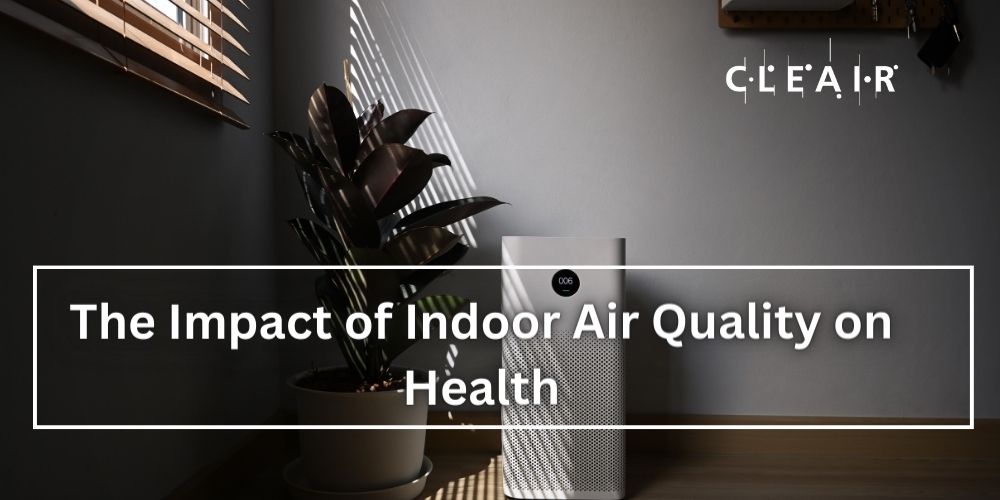
The air we breathe, particularly the air we breathe in our homes, has a significant impact on our overall health and well-being. We often associate air pollution with the outdoors, but the truth is that indoor air quality on health can have a significant impact. In this article, we’ll look at the importance of indoor air quality and how it can affect our health in a variety of ways.
Impact of Indoor Air Quality on Health
- Understanding Indoor Air Quality: The quality of the air inside buildings, such as homes, offices, and other enclosed spaces, is referred to as indoor air quality (IAQ). Temperature, humidity, ventilation, and the presence of pollutants are all factors to consider.
Indoor air pollutants can include:
- Allergens: Dust mites, pet dander, pollen, and mould spores.
- Chemical pollutants: Volatile organic compounds (VOCs) from cleaning products, paints, and furniture.
- Particulate matter: Tiny particles from smoking, cooking, and outdoor sources.
- Biological contaminants: Bacteria, viruses, and fungi.
- Health Effects of Poor Indoor Air Quality: Poor indoor air quality can cause a variety of health issues, some of which are immediate and others that develop over time. Here are some of the health issues associated with poor indoor air quality:
- Health Effects of Poor Indoor Air Quality: Poor indoor air quality can cause a variety of health issues, some of which are immediate and others that develop over time. Here are some of the health issues associated with poor indoor air quality:
- Respiratory Problems: Indoor air pollutants can irritate the respiratory system, causing symptoms such as coughing, sneezing, and wheezing. Poor IAQ can trigger asthma attacks in people who have asthma.
- Allergies: Dust mites and pet dander, for example, thrive in indoor environments. Prolonged contact with these allergens can cause allergies, resulting in symptoms such as a runny nose, itchy eyes, and skin rashes.
- Skin Irritations: Low humidity levels indoors can cause dry and itchy skin, which is exacerbated by heating systems in the winter. Improving indoor air quality, such as using humidifiers, can help to alleviate these discomforts.
- Eye Irritations: When indoor air contains pollutants or is too dry, it is common to experience irritated and watery eyes. Proper ventilation and air purification can help relieve eye strain.
- Vulnerable Groups: Children, the elderly, and people with pre-existing health conditions are especially vulnerable to the negative effects of poor indoor air quality. Pollutant exposure can exacerbate pre-existing health problems for them.
3. Allergies and Asthma: Indoor allergens, such as dust mites, pet dander, and pollen, can wreak havoc on people who suffer from allergies and asthma. Because these allergens can cause allergic reactions and asthma attacks, it is critical to limit their presence indoors.
4. Respiratory Conditions: Poor indoor air quality can aggravate respiratory illnesses like chronic obstructive pulmonary disease (COPD). People who have poor lung function are more vulnerable to the effects of indoor air pollutants. Having cleaner indoor air can help with these conditions.
5. Skin and Eye Irritations: Indoor air deficient in humidity can cause skin dryness, itching, and eye discomfort. Keeping indoor humidity levels optimal and using air purifiers can help to alleviate these issues, promoting healthier skin and more comfortable eyes.
6. Mental Health and Well-being: Indoor air quality can impact our mental health and overall well-being. Poor indoor air quality can contribute to increased stress, poor sleep quality, and general discomfort in our homes. Cleaner indoor air, on the other hand, can contribute to a more relaxing and comfortable environment.
7 Tips for Improving Indoor Air Quality:
Now that we understand the importance of indoor air quality to our health, here are some practical suggestions for improving IAQ:
- Proper Ventilation: Ensure adequate ventilation by opening windows and using exhaust fans when cooking or bathing.
- Air Purifiers: Consider using air purifiers with HEPA filters to remove airborne particles and allergens.
- Regular Cleaning: Maintain a clean living space by dusting, vacuuming, and cleaning surfaces regularly.
- Humidity Control: Use humidifiers in dry environments and dehumidifiers in humid conditions to maintain optimal humidity levels.
- Avoid Smoking Indoors: Smoking indoors significantly degrades indoor air quality; smoking should be done outside.
- HVAC Maintenance: Schedule regular maintenance for your heating, ventilation, and air conditioning (HVAC) system to ensure it operates efficiently.
Conclusion
Indoor air quality is critical to our overall health and well-being. Poor IAQ can cause a variety of health problems, particularly in vulnerable people. We can, however, create a healthier and more comfortable living environment that promotes our overall well-being by taking proactive steps to improve indoor air quality, such as proper ventilation, using air purifiers, and maintaining humidity levels.
If you’re interested in improving your indoor air quality and enhancing your living space’s comfort and health, explore Cleair’s fresh air systems here. Our products are designed to provide comprehensive air quality improvement, ensuring you breathe cleaner and healthier air at home.


